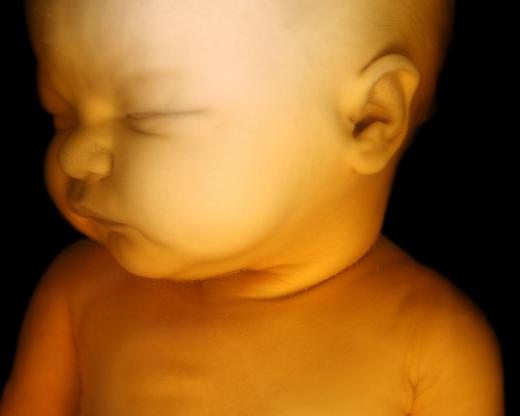What is a Mutagen?
 Mary McMahon
Mary McMahon
A mutagen is a substance which increases the frequency of mutation in a plant or animal population, which can lead to a variety of consequences. Some chemicals have mutagenic properties, and radiation such as ultraviolet light and x-rays is another common source of mutations. Because mutagens can lead to genetic mutations, some of them can contribute to the development of cancers, making these mutagens carcinogenic in addition to mutagenic.
There are a number of ways in which a mutagen can work within a living organism. Most attack the DNA, affecting the organism's genetic code. Some manage to insert themselves into the DNA directly, causing the animal to start reproducing the mutagen because it thinks that it belongs in the DNA. Others cause structural damage, leading to genetic errors which can become catastrophic as cells start replicating, and others manipulate the DNA, forcing it to produce something which is hazardous. Fetuses are particularly susceptible to mutagens because they are growing and developing so rapidly, which is why pregnant women are warned to be extra careful around radiation and chemicals.

People first began to understand how mutagens worked in the 1920s, when researchers in the process of exploring radiation noted a variety of mutations in organisms exposed to high levels of radiation. Over time, a mutagenic link between many forms of radiation and many chemicals was made, illustrating the need to observe precautions in research laboratories, and to test products carefully before releasing them to the general public.

As doctors learned to their dismay in the 1950s with thalidomide, mutagens are not always consistent or predictable. Even though many living organisms have very similar genetic codes, a mutagen may cause problems in one organism, but not in another. In the case of thalidomide, the medication caused birth defects in humans, but not in the animals it was tested on.

In addition to causing mutations in living organisms, as for example when exposure to a mutagen leads to the development of a cancerous tumor, mutagens can also cause birth defects. Furthermore, mutagen exposure may result in the transmission of a sort of genetic time bomb, a mutated gene or sequence which may become a problem in future generations. The mutagen might cause the development of a recessive trait which is brought out when two descendants of people exposed to the substance have children. The cause of the appearance of a birth defect may be difficult to pin down if the exposure occurred several generations ago, causing confusion for the parents and the supervising doctor.
AS FEATURED ON:
AS FEATURED ON:













Discussion Comments
@burcidi-- UV rays! Most people don't realize this but UV rays are a mutagen too. That's how people get skin cancer if they're exposed to too many UV rays without protection.
I had an aunt pass away from skin cancer and I never step out of the house without applying lotions with UV protection. I also avoid being in the sun if I can between 11am and 4pm.
By the way, just because a lotion has SPF doesn't mean that it has UV protection. They're different things! There are different sun rays and UV is the most dangerous and it causes mutations in our cells and DNA!
@burcidi-- I remember my instructor mentioning a study about mutagenesis and microwaves. I believe this study was done in the late 70s and they found that microwaves don't have mutagenic activity. But I don't know if another study was done after this and what their findings were.
Actually frying foods on the stove or grilling meat probably has more mutagenic risk than microwaves do. It's been shown that fried foods, especially if they're fried in high temperatures and if the same cooking oil is used twice, are toxic.
In my opinion, it's best to cook on the stove on low heat and avoid frying foods. Obviously exposure to radiation is a risk, but so are things which you consume. It doesn't cause problems overnight, but increases the risk of cancer in the long term.
This is why my mom is not allowed to get x-rays.
She has a fibroadenoma (basically a lump) in her breast. It's not malignant thankfully nor is it growing. But her doctor has told her not to get any x-rays unless it's of high importance because it's a mutagen. Even though the fibroadenoma is under control and is not a risk now, x-rays could cause it to grow and become malignant.
Does anyone know what other common mutagens are? For example, I've heard that there is some radiation being emitted from household appliances like microwaves and even cell phones. Are these radiation levels high enough to be mutagens? Should we be worried about them?
Post your comments